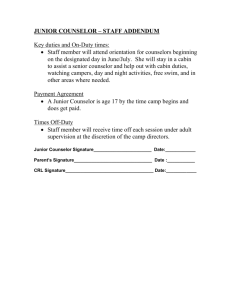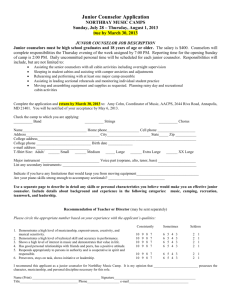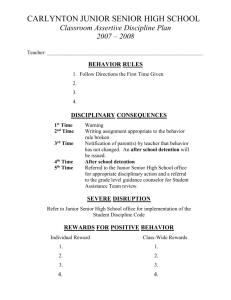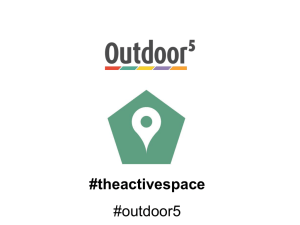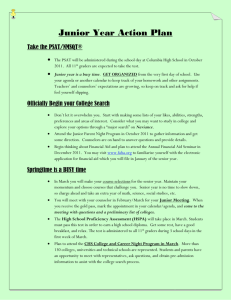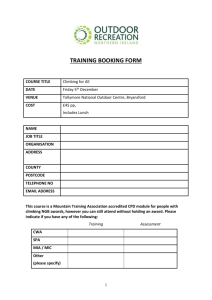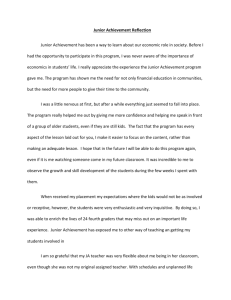about being a junior counselor
advertisement
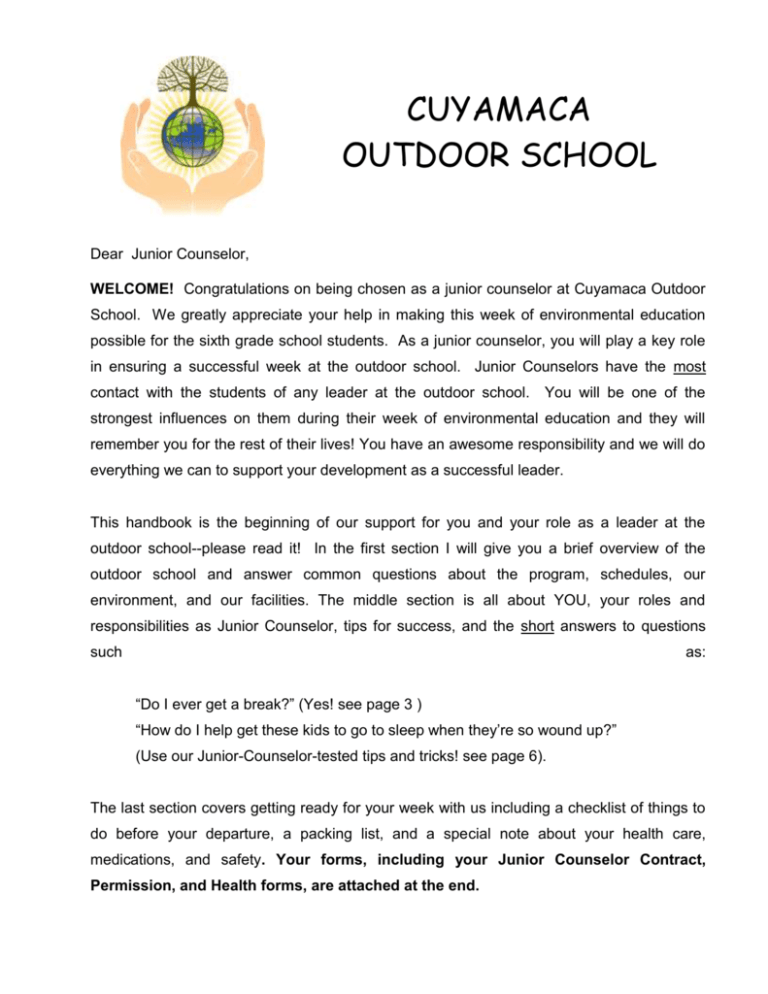
CUYAMACA OUTDOOR SCHOOL Dear Junior Counselor, WELCOME! Congratulations on being chosen as a junior counselor at Cuyamaca Outdoor School. We greatly appreciate your help in making this week of environmental education possible for the sixth grade school students. As a junior counselor, you will play a key role in ensuring a successful week at the outdoor school. Junior Counselors have the most contact with the students of any leader at the outdoor school. You will be one of the strongest influences on them during their week of environmental education and they will remember you for the rest of their lives! You have an awesome responsibility and we will do everything we can to support your development as a successful leader. This handbook is the beginning of our support for you and your role as a leader at the outdoor school--please read it! In the first section I will give you a brief overview of the outdoor school and answer common questions about the program, schedules, our environment, and our facilities. The middle section is all about YOU, your roles and responsibilities as Junior Counselor, tips for success, and the short answers to questions such as: “Do I ever get a break?” (Yes! see page 3 ) “How do I help get these kids to go to sleep when they’re so wound up?” (Use our Junior-Counselor-tested tips and tricks! see page 6). The last section covers getting ready for your week with us including a checklist of things to do before your departure, a packing list, and a special note about your health care, medications, and safety. Your forms, including your Junior Counselor Contract, Permission, and Health forms, are attached at the end. ABOUT THE CUYAMACA OUTDOOR SCHOOL Who are we? The Cuyamaca Outdoor School is a part of the San Diego County Office of Education and is certified by the California Outdoor School Administrator’s Association as meeting all curriculum, staff, and facility standards for a Residential Outdoor Science School. We have been in continuous operation since 1946 and share our outdoor classroom with over five thousand elementary students per year. What are we doing here? It’s simple; we are here to make certain that each week at Cuyamaca Outdoor School every student is a success. We provide the following four educational programs: 1. Elementary students gain hands-on understanding and appreciation of nature while developing positive life skills; 2. Middle school students participate in an education and leadership mentoring program; 3. Classroom teachers receive training and practical experience in outdoor education; 4. Outdoor School staff continue their individual professional development. What is a typical program like? Programs are four or five days long. Each program begins with arrival and an orientation just before lunch. The midweek includes assisting classes, supervising and training throughout the week, and conclude with closure activities, evaluations, a last round of campfire songs, and departure just before noon with a last snack before the trip home. The program days are filled with outdoor classes and activities from 7:00 a.m.-9:30 p.m. A typical daily schedule follows: 7:00 a.m. 7:30 a.m. 8:00 a.m. 8:45 a.m. 9:15 a.m. 12:15 p.m. 1:15 p.m. 4:15 p.m. 5:15 p.m. 6:00 p.m. 6:45 p.m. 8:00 p.m. 9:15 p.m. 2 Students in cabin getting ready for the day Breakfast Students meet with Classroom Teachers Students get ready for hikes in the cabin Morning Nature Study Class Lunch followed by quick clean-up Afternoon Nature Study Class Showers Dinner Students have cabin time Evening Program Evening Activities, Junior Counselor meet with Cuyamaca mentors Prepare for bed, 9:30 p.m. lights out, 9:45 p.m. all quiet, Camp Teachers on duty Where are we & what is it like here? We are in the Cuyamaca State Park. The area was once home to the Kumeyaay people who have left evidence behind. There are some stands of pine, cedar, oak and lots of meadows. In the meadows we can see deer, squirrels and other small animals. In fall and late spring the daytime temperatures are in the 60’s to 70’s, nighttime lows are in the 40’s. We sometimes get snow from November through February with daytime highs in the 40’s and overnight lows in the 20’s. The weather can surprise us so be prepared. How are the facilities? We have big cabins with small living spaces within called dens. Our cabins have all the basics- heat, light, bunk beds, doors, and windows. Each cabin has showers and restrooms in the center (you don’t have to go outside!), and a center open bedroom where the night cabin leaders stay. Yes- there are curtains on the showers. Yes- there are doors on the stalls, and Yes- the toilets flush . The kitchen, (yes-the food is good, and you can have seconds and thirds), offices and dining hall are in the center of the school. The Health Center is in the middle of the whole site so everyone can get there easily. ABOUT BEING A JUNIOR COUNSELOR “Best experience of my life!” “Exhausting!” “Be strict from the start- I tried to be too nice.” Junior counselors have a lot to say at the end of the week- but the good ones never say it was easy or boring! A good way to visualize the experience is to think of yourself in a week-long play: You are in at least four different roles (sometimes all at the same time) You are “on-stage” almost 24 hours a day There are about 125 other actors (students, cabin leaders, teachers, permanent staff) AND- No one knows their lines because there is no script! Everyone has to just play out their roles doing the best that they can! Oh - and it’s not a play, it’s real. Your duties as a junior counselor begin when you step onto the school grounds to board the bus for the Outdoor School. These duties end when you say goodbye to students and teachers. TIME OFF - Except for the first and last day, you will have approximately two hours off each day during a morning or an afternoon class period. During this time you may shower (note posted times when showers are closed for sanitizing) nap, hike (with another group), or do homework. As a Junior Counselor you are a part of our staff for the week. Our Junior Counselor Coordinator and other staff will give you tips and training throughout the week as well as providing you with feedback after class, daily summaries and mentoring, and an end-of-program evaluation. We are committed to your success and the development of your leadership skills. If you’re having problems at any time please talk to us about it. 3 What are my “roles”? 1) First and foremost your primary role is as a committed team player on our outdoor school education team. Whatever choices you make must support the team goals and strategies. The team leadership includes the outdoor school principal, head teachers, camp teachers, night cabin leaders and other staff. Our Junior Counselor Coordinator (your personal mentor or “coach” if you prefer) for the week, and is the primary trainer for the junior counselors. We will have junior counselor “team meetings” on the day you arrive and one each morning and evening throughout the program to make sure communication is happening and we are all on the same page. 2) Another obvious role is as the big sister or big brother to your cabin den. You ARE the role model in your cabin den! This means that you have to do all kinds of crazy grown up things like: Help students say “I’m sorry” to another child when they need to Remind them of things over and over again Help them change toward more successful behavior 3) And, most importantly, create a safe and secure “Home” in your cabin for every child. The tips in this handbook (pg.5) will help you get started, our meetings will carry you forward. Your other roles during the week will include (but will certainly NOT be limited to) being the Teacher’s Aide with naturalists or camp teachers on classes each day and being Coach and/or Referee for students during recess each day. What are the major responsibilities? Of course, overall you are responsible for being a good role model for the students, a positive helper to the classroom teachers, camp teachers, night cabin leaders and other junior counselors (see the tips section and specifics below for how to get started, there will be LOTS more to come in our training sessions), and an active and enthusiastic member of our team. It’s easiest to think of the specific responsibilities in terms of the flow of the program. Here’s an overviewagain; there will be more details once you get here 1. It may seem silly to bring it up, but your first responsibility is to read (and to really think about) this handbook, then make certain you follow the checklist of things to do before your program departure....otherwise you won’t be able to be here! 2. Before boarding the bus: Check-in with the classroom teachers or the administrator, give them your paperwork, and ask for direction on how you can help with organizing luggage and students. 3. During bus travel: Set a positive tone with the students. Make sure the junior counselors are located throughout the bus, rather than sitting all together. By doing this you can better help the classroom teachers with supervision and ensure establishing a positive rapport with the students. 4 4. On arrival: Supervise students’ use of restroom (yes, you can “go” also), unload luggage, meet the outdoor school head teacher and principal, begin training, share ideas and goals and begin building our team for the week. 5. In staff meetings: Listen actively, contribute ideas appropriately, help us stay on task and be positive! 6. At meals: Be in charge of your table! Help students find their place, take role, maintain and model table manners, assign responsibilities to students, and direct clean up activities at your table. 7. In the cabin: Again, be a good role model (see “tips” on p.6), and know that we will provide more help with this when you get here. This includes assuring student safety and appropriateness, getting them all involved in positive activities at all times and referring them out for help with behavior issues. Make certain that all school rules are followed at all times. 8. In class and during Evening Program activities: Assist the instructor; contribute to an appropriately enthusiastic tone. You are responsible for assisting with one class and with evening program each full day, the other class period will be your break time (two hours). Ask questions when something isn’t clear to you. Help the students avoid distracting behavior. If we’re doing an all-day class we’ll try to make it up to you by cutting our evening meeting short. 9. During recess: You’re in charge of helping the students find fun and engaging activities. If not needed to referee, join in, but be prepared to leave a game to assist students needing help. Showers Supervise students’ health and safety - prevent running, pushing, and other behavior that might result in injury. As students at this age are very sensitive about their personal appearance, it is of importance that you act strongly to prevent teasing behavior or name calling. Cameras are not permitted in the bathrooms, showers or cabins. Bedtime At bedtime you will escort your students back to their cabin. Please note that all students and staff need to wear pajamas or sweats to bed in case an emergency demands they quickly leave their cabin. The Night Cabin Leaders will direct activities, tell stories and run bedtime. You can help by being a good role model in your den, letting the students see that it’s quiet time when lights are out. Your most important responsibility is to assist with the supervision necessary to maintain the health, safety, and well being of the students. Ensure that student guidelines are followed by you as well as by the students. 5 SUPERVISION OF STUDENTS When Talking with the Students 1. Be specific in your directions and requests. For example: State "The all-quiet bell rang, and I want you to stop talking now, " rather than "Behave yourself." 2. Be matter-of-fact rather than ask permission. For example: State "Please be ready for showers in five minutes" rather than "Get ready for showers, O.K.?" 3. Refrain from name calling. For example: state "You need to stop running NOW and walk" rather than "Chill, brats!" 4. Refrain from asking questions that cannot be answered. For example: State "You were asked to stop teasing George. You did not. Now you must go to the office" rather than "Why can't you stop being such a pain?" MANAGING STUDENT BEHAVIOR Suggestions for working with your cabin group: 1. Learn the names of the students in your cabin group: do your best to do so by dinner the first day. 2. Find something positive about each student. Compliment in public, criticize in private; offer praise in front of others, but take a student quietly aside when you need to speak to him or her about a needed change in behavior. 3. When reprimanding or praising a student, describe the behavior rather than the person. "Stop running! Please walk," rather than "You Idiot! Can't you remember anything?" or "I appreciate how well you swept the floor! Thank You." rather than saying "Hey, you're not so stupid after all!" 4. Delegate responsibility. Divide a job into smaller tasks and allow students their choice of duties. CAMPFIRE AND LARGE-GROUP HIKES Stay with your students during hikes and campfire programs. Junior counselors should not stand or sit next to other junior counselors to improve control, safety and good interaction with the students. What are the Rules? As a California Outdoor School we all have to follow the same rules that apply to any school. For starters, that means no alcohol/drugs/or tobacco of any kind are permitted, no acts of violence or threats of violence, and no weapons or potential weapons of any kind. Refrain from discussing topics inappropriate to a school setting or to your role as a responsible leader of sixth grade students. You are still under all the rules and policies of your middle school while you are here. 6 PROHIBITED ACTIONS: The following disciplinary measures are STRICTLY FORBIDDEN: 1. 2. 3. 4. 5. Administering corporal punishment (eg. spanking, shoving, shaking); Assigning push ups or other exercises; Requiring the student to do something embarrassing; Using abusive, foul or humiliating language; Threatening the student with consequences that will not be administered. Examples: "I'll punch the next person I see doing that." "The next person who talks will sleep outside." "I'll call your parents and have them take you home". The Cuyamaca staff, the head teacher, the classroom teacher, and the principal are all available for assistance with discipline. DISMISSAL FROM THE OUTDOOR SCHOOL Of course any staff member, junior counselor or permanent staff, will be suspended from duty and sent home for severely inappropriate behavior such as the use of alcohol, illegal drugs, or failure to follow the directions of the permanent staff. Additionally, a junior counselor will be sent home if the principal determines that their continued presence will undermine the success of the program or other staff. When a junior counselor is to be dismissed, the principal will meet with the junior counselor to discuss the circumstances giving cause for the dismissal. The principal will then notify the principal(s) of the school(s) attending that the junior counselor has been dismissed. The school principal(s) will then notify the junior counselor’s parent(s) to make arrangement for transportation home. The outdoor school principal will send a written report of the events leading to the dismissal to the junior counselor’s school and any other school(s) attending. DISCIPLINARY PROCEDURES FOR STUDENTS Junior counselors will at all times enforce the rules and policies of the outdoor school. Students who violate these rules are to be sent with a responsible escort to a camp teacher for disciplinary action and counseling. If the situation warrants, send a pair of students to bring a camp teacher to the scene. If you are uncertain as to what course of action to take, consult with camp teacher or classroom teacher. An infraction of the rules by a student will result in his/her name and the details of the incident being entered in the referral book in the office. A “referral” means disciplinary counseling and a commitment, made by the student, to change their behavior. 1) First referral = results in a student’s first referral or written warning. 2) Second referral = conference with their school teacher and missing the next recess activity. 3) Third referral = Phone call home and a plan is developed with the student’s help to insure they can stay at outdoor school 4) Fourth referral = Student is suspended from Outdoor School. 7 SUGGESTED CLOTHING AND EQUIPMENT LIST Cuyamaca Outdoor School is at 2,200 feet in elevation. You may want to check the weather forecast before packing. Nights and early mornings are chilly, be prepared. Old clothes are ideal. If in doubt, it is better to over pack rather than to under pack. Leave the more brightly colored clothing home to avoid attracting bees and wasps. A complete change for each day is recommended since you will be outdoors and active. CLOTHING: Pajamas Jacket/Sweater Underwear Long pants Socks T-shirts (sleeves required) Comfortable shoes COLD WEATHER CLOTHING: Mittens/Gloves Warm hat Waterproof boots Long Underwear Extra Socks (not cotton if possible) Raincoat/Poncho/Large garbage bag SUPPLIES: Sleeping bag or Sheets & Blankets Pillow Water bottle Watch Pencil/Pen Camera/Film Towel/Washcloth Soap/Shampoo Chap stick Sunglasses Sun hat Toothbrush Toothpaste Hand lotion Sunscreen Sandals for shower Notebook/Paper Envelopes/stamps ITEMS TO BE KEPT AT HOME Money (less than $10 ok) Candy or other food Guns Knives Comic Books Radios Tape players Electronic Games Boomboxes **Gum CD players Curling Irons Hatchet · Walkie-talkies Cell phones (no reception in mountains) **With permission from the visiting teacher(s) and the bus driver, gum may be permissible EN ROUTE ONLY to and from the Outdoor School to help equalize ear pressure. For safety reasons shorts cannot be worn on classes or hikes; however you may bring a couple of pairs for late afternoon, evening (cabin time) 8 JUNIOR COUNSELOR CONTRACT I hereby volunteer to participate as a junior counselor at Cuyamaca Outdoor School. I understand that I will be participating in an education and leadership mentoring program and that I will receive room and board for volunteering my services. I also understand that I will be responsible for assisting in the supervision of students for most of the 24-hour day; that I will be living with students. I will be accompanying students on classes and during the evening activities. I agree to abide by the general policies and procedures outlined in the Junior Counselor Information booklet as well as by the specific training and direction I receive at the outdoor school from the staff. I understand that a failure to abide by my middle school or outdoor school policies or a failure to follow the guidance and direction of the staff will result in disciplinary consequences which may include being sent home from outdoor school, and suspension or expulsion from school I understand that the principal is available to me as a resource should I need assistance in performing my duties. I HAVE RECEIVED AND READ A COMPLETE COPY OF THE JUNIOR COUNSELOR INFORMATION BOOKLET. I give permission for my child to participate in the following field trip activity: OUTDOOR SCIENCE SCHOOL TRIP TO CUYAMACA OUTDOOR SCHOOL. I understand that as an outdoor education center my child will be hiking an average of 5 to 6 miles per day and will be exposed to the inherent risks associated with natural and outdoor recreation settings. I further understand that my child may be filmed or photographed during their trip for media coverage or promotional purposes and give permission for such non-commercial use. I also understand that the Cuyamaca Outdoor School and staff are not responsible for lost, damaged, or stolen goods. Nature of trip: OUTDOOR SCIENCE, NATURE STUDY, LIFE SKILLS, & RECREATION Location of activity: Cuyamaca Outdoor School, nearby Field Locations, and Transit Routes Dates of trip: ___________ Signature of junior counselor (In Ink) _______________________ Date Print name _________ Parent Signature 9 __________ _____ INSERT STUDENT HEALTH FORM HERE And medical authorization sheet 10
